10 Business Intelligence Tools for Healthcare Analysts

10 Business Intelligence Tools for Healthcare Analysts
Introduction
In an era where data drives decisions, the healthcare sector is increasingly turning to business intelligence tools to enhance patient care and operational efficiency. These innovative platforms streamline access to crucial datasets, empowering analysts to uncover insights that can transform healthcare delivery. However, with so many options available, how can healthcare professionals identify the most effective tools to meet their unique needs?
This article explores ten cutting-edge business intelligence tools that are reshaping the landscape of healthcare analytics. Each tool offers distinct features, advantages, and benefits that can significantly impact patient outcomes. By understanding these tools, healthcare professionals can make informed decisions that enhance their operations and improve patient care.
Initial Data Offering: Streamline Access to Healthcare Datasets
The Initial Data Offering (IDO) serves as a dynamic platform designed to simplify the process of launching and discovering new datasets, especially within the medical field. By curating high-quality datasets, IDO allows analysts to access essential information quickly, which facilitates better decision-making. This platform features a diverse range of datasets, including:
- Alternative information
- Fundamentals
- ESG metrics
All crucial for understanding market trends and consumer needs.
One of the standout features of IDO is its integration with SavvyIQ's AI-powered Recursive Data Engine. This technology continuously enriches a dynamic graph of 265 million global entities, empowering analysts to make informed decisions and automate workflows effectively. How might this capability enhance your analytical processes? The streamlined access to information not only boosts the efficiency of analysts but also significantly improves patient care and operational efficiency in medical organizations by utilizing business intelligence for healthcare.
In summary, the IDO platform is not just about data; it’s about transforming how medical analysts engage with information. By leveraging these datasets, professionals can enhance their decision-making processes through business intelligence for healthcare, ultimately leading to better outcomes in patient care and organizational performance. Are you ready to explore how these datasets can impact your work?
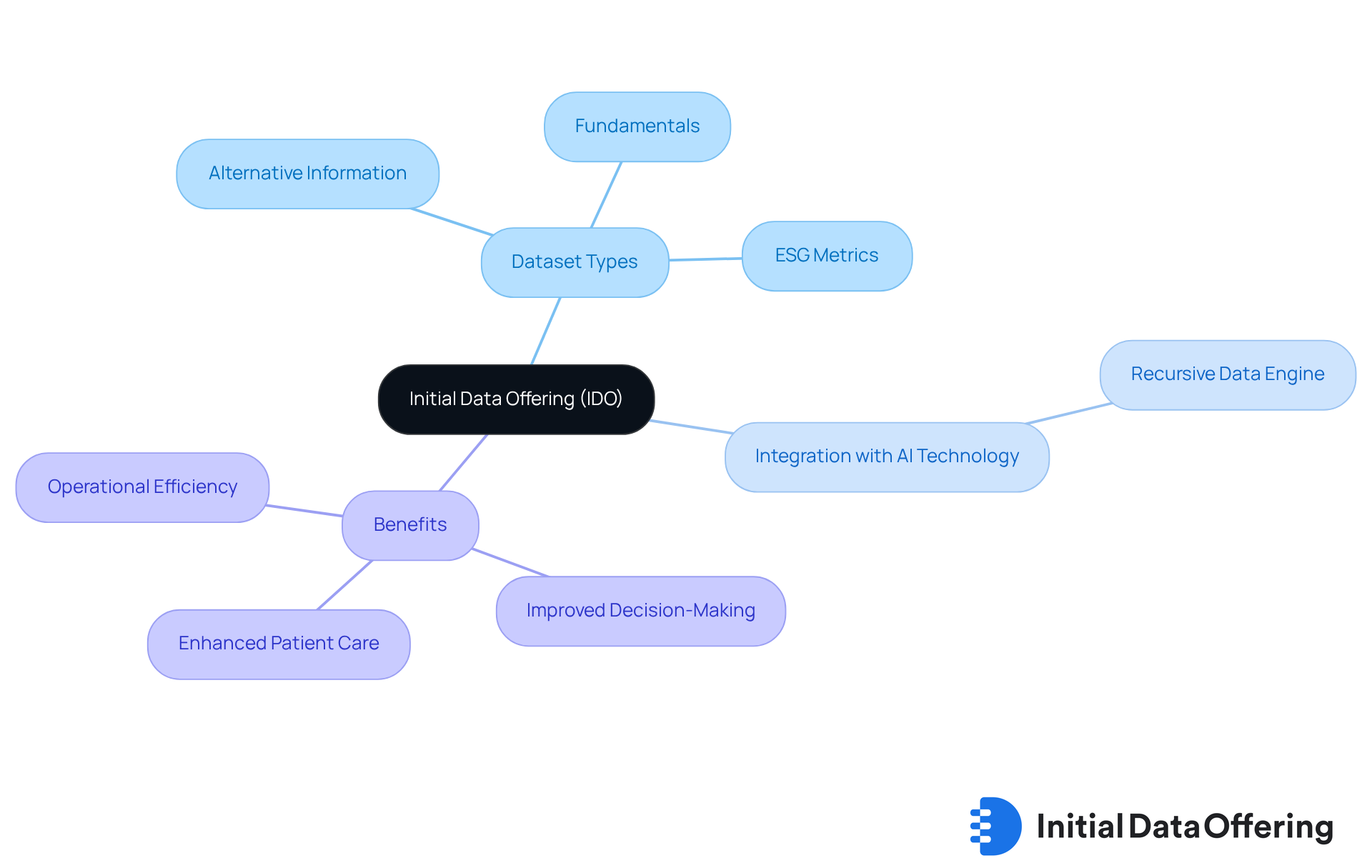
ThoughtSpot: Enhance Patient Care with AI-Driven Analytics
ThoughtSpot is an AI-driven analytics platform designed specifically for analysts in the medical field, enabling them to extract insights from extensive datasets with remarkable speed and efficiency. Its intuitive, search-driven interface allows users to pose questions in natural language, facilitating seamless data exploration. By harnessing the power of AI, ThoughtSpot empowers medical organizations to leverage business intelligence for healthcare to uncover trends, enhance individual care, and improve operational efficiency. This platform's ability to provide real-time insights exemplifies business intelligence for healthcare, equipping professionals with the necessary information to make informed decisions and significantly improving outcomes for patients.
Healthcare organizations that utilize ThoughtSpot have reported notable improvements in business intelligence for healthcare and patient care. For instance, Portsmouth Hospitals expanded their maternity appointment capacity by 33% through intelligent automation, showcasing how data-driven insights can streamline operations and enhance patient experiences. Additionally, 55% of medical organizations have either fully integrated or are nearing completion of deploying AI tools for client scheduling and waitlist management, underscoring the broader impact of AI on operational efficiencies within the medical sector. Furthermore, the integration of AI analytics has led to a decrease in hospital readmission rates by approximately 45% in specific chronic disease groups. Providers using AI for predictive analytics have experienced up to a 50% reduction in hospital readmissions, highlighting the platform's potential to improve health outcomes.
Healthcare professionals recognize the transformative role of ThoughtSpot in enhancing patient care. A recent AMA survey revealed that 66% of physicians reported using medical AI in 2024, marking a significant increase from previous years and indicating a growing trend toward data-driven medicine. As organizations continue to adopt AI analytics, the anticipated impact on patient care outcomes through business intelligence for healthcare is substantial, paving the way for more personalized and effective medical delivery. To successfully implement AI tools like ThoughtSpot, medical organizations should prioritize training staff to fully leverage these technologies, ensuring they can maximize the benefits of data-driven insights.

Tableau: Visualize Healthcare Data for Better Decision-Making
Tableau is a leading visualization tool that empowers analysts in the medical field to create interactive and shareable dashboards. By transforming complex datasets into visual formats, Tableau helps users uncover patterns and trends that may be hidden in raw data. This capability is crucial in healthcare, where business intelligence for healthcare can significantly enhance patient outcomes and operational efficiencies by providing timely insights.
For example, medical organizations that have adopted Tableau report improved compliance and operational metrics. In fact, 75% of medical practitioners in Saudi Arabia express concerns about the accuracy of the information they rely on. This highlights the necessity of reliable information visualization tools like Tableau to address these challenges. By utilizing Tableau as a tool for business intelligence for healthcare, analysts can effectively monitor key performance indicators (KPIs) and make informed, data-driven decisions that elevate care delivery.
The integration of visual analytics not only streamlines workflows but also fosters a deeper understanding of patient information, ultimately leading to better medical outcomes. As noted by medical information analysts, business intelligence for healthcare indicates that information visualization in the medical field is no longer a choice—it’s essential for contemporary health organizations striving to enhance care delivery and coordination.
Moreover, the case study of Intermountain Healthcare demonstrates how rethinking information strategies with Tableau can revolutionize medical service delivery. This example underscores the practical applications and advantages of using Tableau in healthcare settings. How might your organization benefit from implementing such a tool? By embracing these innovative strategies, healthcare professionals can improve their service delivery and patient care.
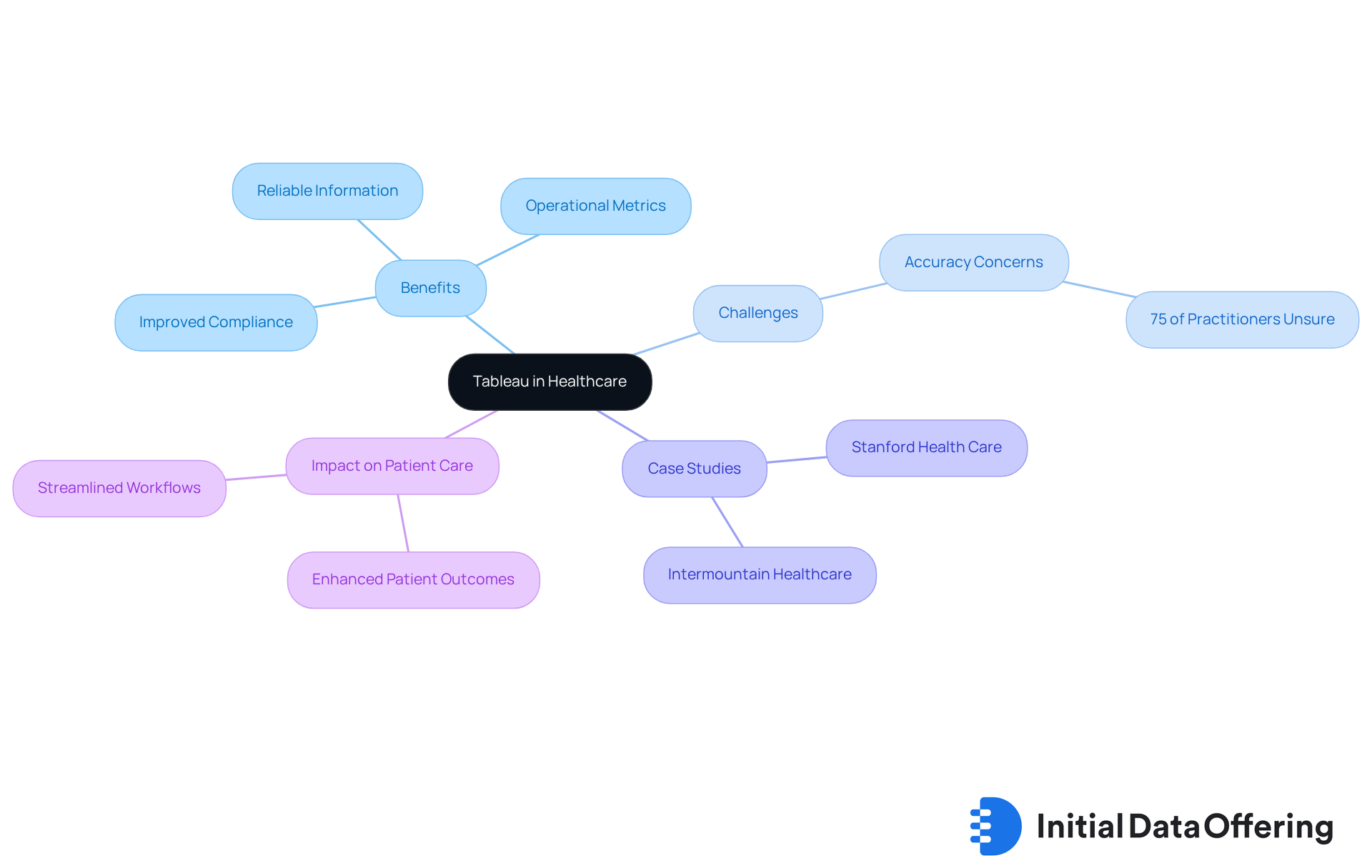
Microsoft Power BI: Analyze Patient Data for Improved Outcomes
Microsoft Power BI is a powerful analytics tool that enables healthcare analysts to visualize and analyze information effectively. Its intuitive interface and seamless integration capabilities allow organizations to consolidate data from various sources, creating a comprehensive view of care. For instance, the U.S. Veterans Health Administration used Power BI to identify high-risk individuals, facilitating proactive interventions that improved health trajectories and reduced hospital visits. Similarly, Mount Sinai Health System leveraged Power BI to boost satisfaction scores from 78% to 89% by monitoring key metrics in real-time.
By creating interactive reports and dashboards, analysts can uncover trends and insights that support informed decision-making. The ability to track essential quality metrics, such as infection rates and readmission statistics, empowers healthcare leaders to respond swiftly to emerging challenges, ultimately enhancing outcomes for patients. For example, Rush University Medical Center achieved 27 fewer readmissions and saved approximately $694,000 by tailoring post-discharge care through advanced analytics. Moreover, NHS England reduced ER congestion by 22% in 2024 by focusing staffing in flu-affected regions with Power BI, demonstrating its effectiveness in managing care and operational efficiency.
Furthermore, Power BI's integration features simplify information from Electronic Health Records (EHR) and other systems, ensuring that medical providers have access to timely and accurate information. This extensive information environment fosters a culture of insight-driven strategies, leading to enhanced operational efficiencies and improved patient care. Cleveland Clinic reported a 31% reduction in inpatient discharge delays using Power BI, with average discharge times improving by two hours within a month after streamlining processes. As medical organizations increasingly recognize the importance of business intelligence, Power BI emerges as a crucial tool for transforming raw data into actionable insights, driving innovation and improving outcomes across the industry. Additionally, Power BI complies with HIPAA and GDPR, reinforcing its suitability for medical organizations.
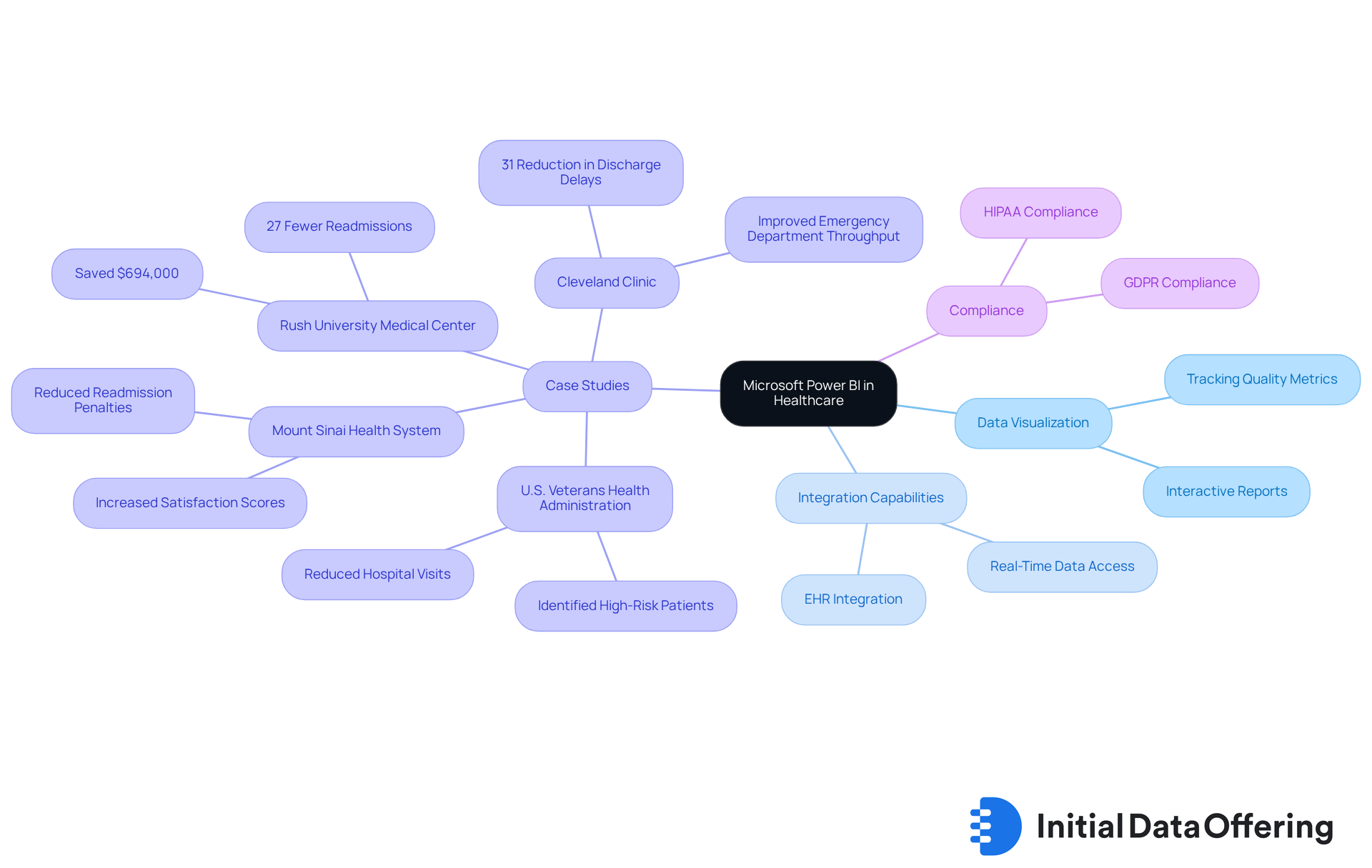
Qlik Sense: Explore Patient Care Trends with Flexible Analytics
Qlik Sense stands out as a powerful data analysis platform tailored for business intelligence for healthcare analysts. Its associative data model allows for intuitive navigation through complex datasets, enabling users to uncover critical insights that significantly enhance decision-making. By promoting self-service data analysis, Qlik Sense empowers healthcare professionals to independently generate reports and dashboards, thereby enhancing business intelligence for healthcare and eliminating the need for IT involvement. This capability is crucial for organizations aiming to swiftly adapt to evolving client needs and improve care delivery based on real-time insights.
How does this adaptability impact healthcare outcomes? Experts emphasize that such flexibility in analysis not only streamlines operations but also greatly enhances patient outcomes by facilitating timely and informed decisions. According to industry forecasts, the self-service data analysis market is projected to reach USD 24.4 billion by 2035, growing at a CAGR of 15.9% from 2025 to 2035. This statistic underscores the increasing importance of these tools in the medical field.
Moreover, case studies, such as those from Wise Health System, illustrate the tangible benefits of analytics. These examples show how business intelligence for healthcare has led to significant improvements in patient outcomes, reinforcing the critical role of adaptable analytics in transforming healthcare delivery. As healthcare professionals consider integrating such tools, the implications for enhanced decision-making and patient care are clear.
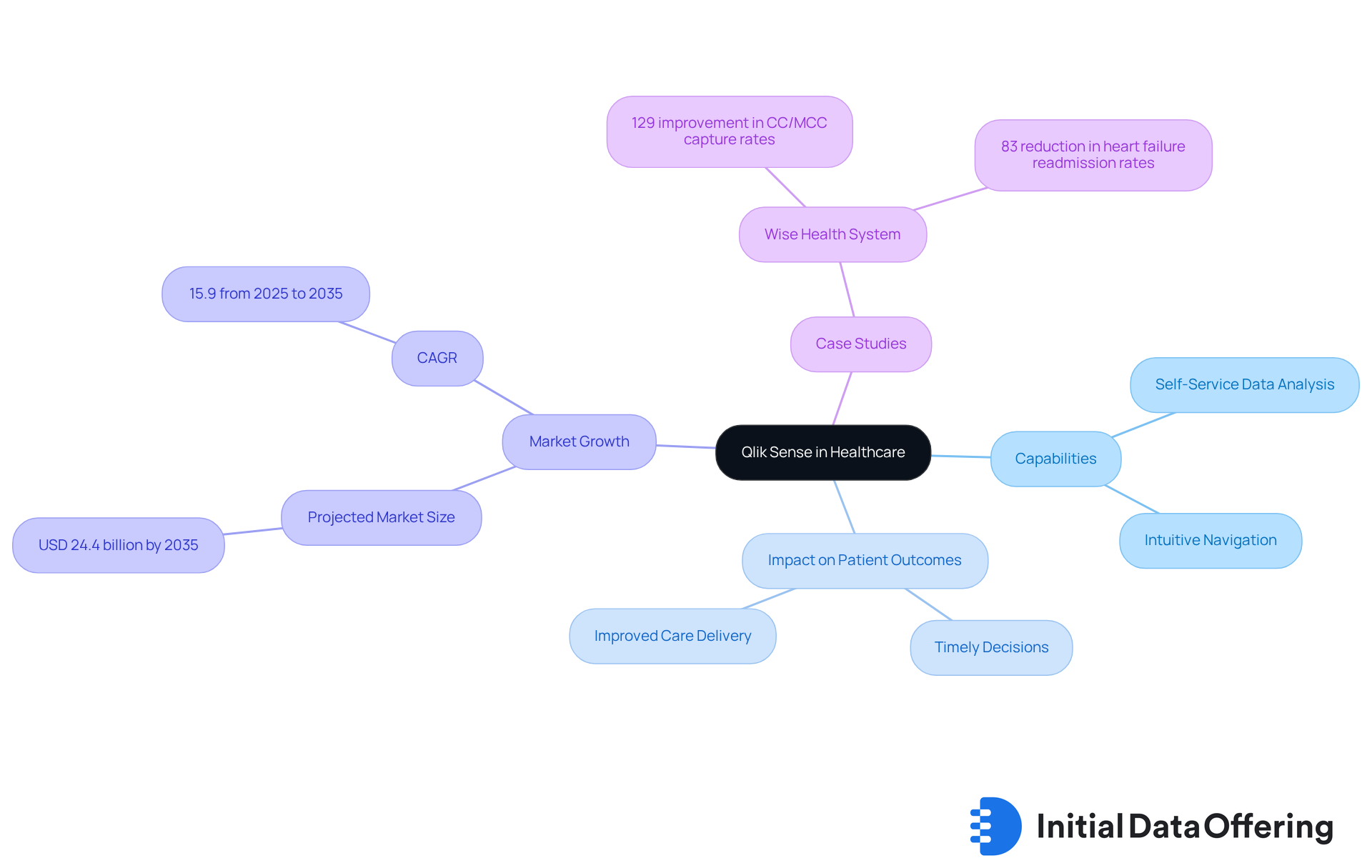
IBM Watson Health: Leverage AI for Accelerated Drug Discovery
IBM Watson Health harnesses the power of artificial intelligence to revolutionize drug discovery and development. By analyzing extensive datasets, Watson identifies potential drug candidates and predicts their effectiveness. This capability significantly reduces the time and costs typically associated with traditional drug development processes. In the medical field, where prompt access to new therapies can greatly improve individual outcomes, this ability is vital. For instance, AI technologies have been shown to accelerate key steps in drug development, with AI-discovered molecules achieving an impressive 80-90% success rate in Phase I trials, far exceeding historic industry averages.
Healthcare analysts can leverage business intelligence for healthcare by utilizing Watson's insights to refine research strategies and foster collaboration among pharmaceutical teams. The integration of AI not only streamlines workflows but also enhances the accuracy of clinical trial designs, enabling faster and more reliable results. As the market for AI in pharmaceuticals is expected to expand considerably, with a compound annual growth rate of 27%, the role of AI tools like Watson will become ever more crucial in influencing the future of drug development in the medical field. However, it is essential to consider the regulatory concerns surrounding AI in clinical trials, as these can impact the adoption and implementation of such technologies.
Additionally, the average time to bring a drug to market exceeds 10 years and costs over 1.9 million Euros, underscoring the efficiency improvements that AI can provide. Significant instances, like AstraZeneca's partnerships and Pfizer's incorporation of AI, demonstrate the practical uses of Watson's abilities in improving participant recruitment and trial design. How might these advancements in AI influence your approach to drug development?
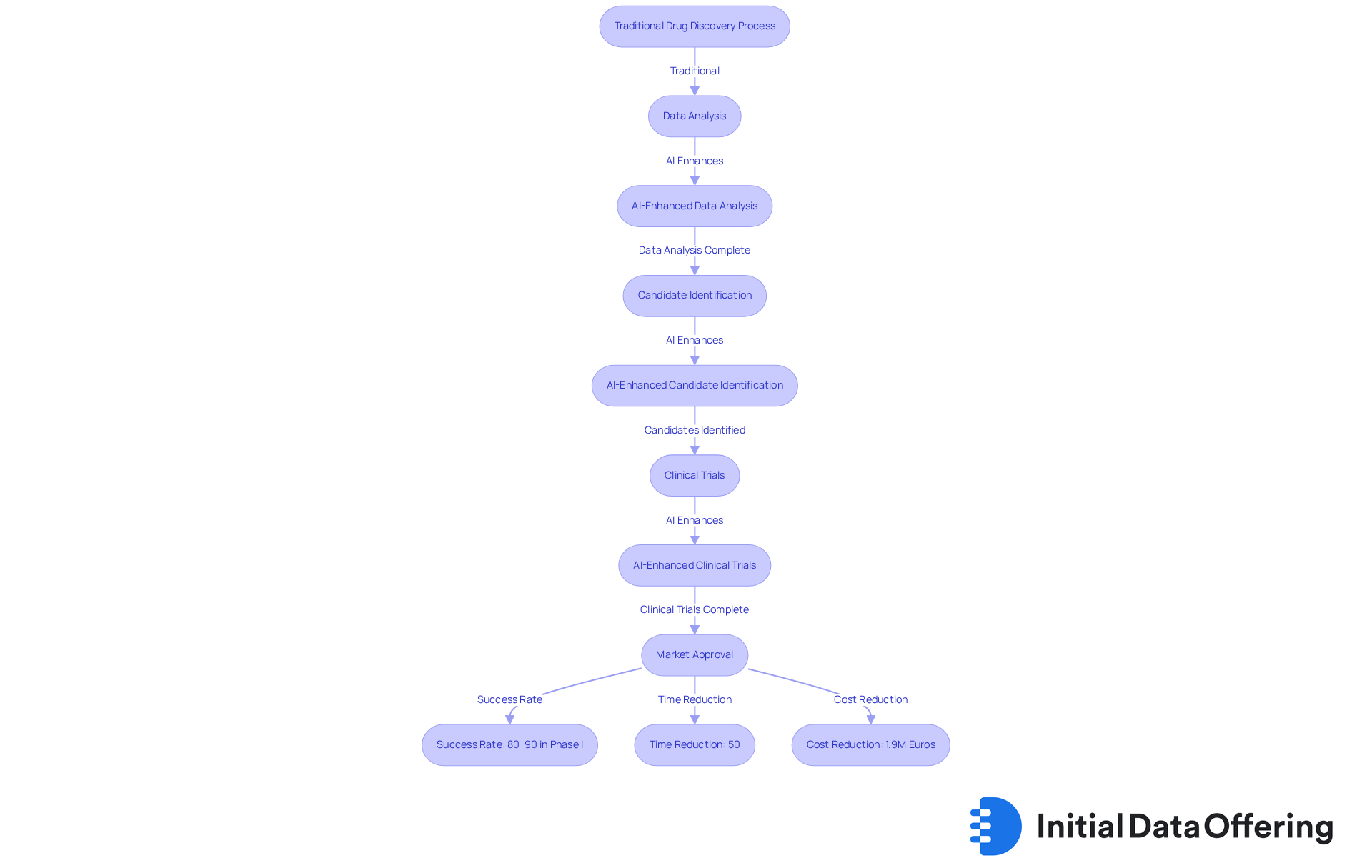
Sisense: Integrate and Share Healthcare Data Seamlessly
Sisense is a powerful analytics platform designed specifically for medical organizations, providing business intelligence for healthcare by enabling seamless integration and sharing of information across various departments. Its advanced data modeling capabilities allow analysts to create comprehensive dashboards that deliver critical insights into business intelligence for healthcare, operational efficiency, and financial performance. This feature not only enhances collaboration among medical teams but also ensures that all stakeholders have prompt access to essential information, facilitating informed decision-making.
What does this mean for healthcare providers? By promoting collaboration, Sisense significantly improves operational efficiency, ultimately leading to better patient outcomes. In a landscape where fragmented information sources pose challenges, Sisense's capabilities in business intelligence for healthcare are essential for navigating the complexities of medical information management.
Furthermore, with the need for adherence to standards like HIPAA, the advantages of using Sisense become even more apparent. It empowers organizations to manage their data responsibly while enhancing service delivery. How can your organization leverage these insights to improve patient care? By integrating Sisense into your operations, you can ensure that your teams are equipped with the right tools to make data-driven decisions, fostering an environment of continuous improvement.
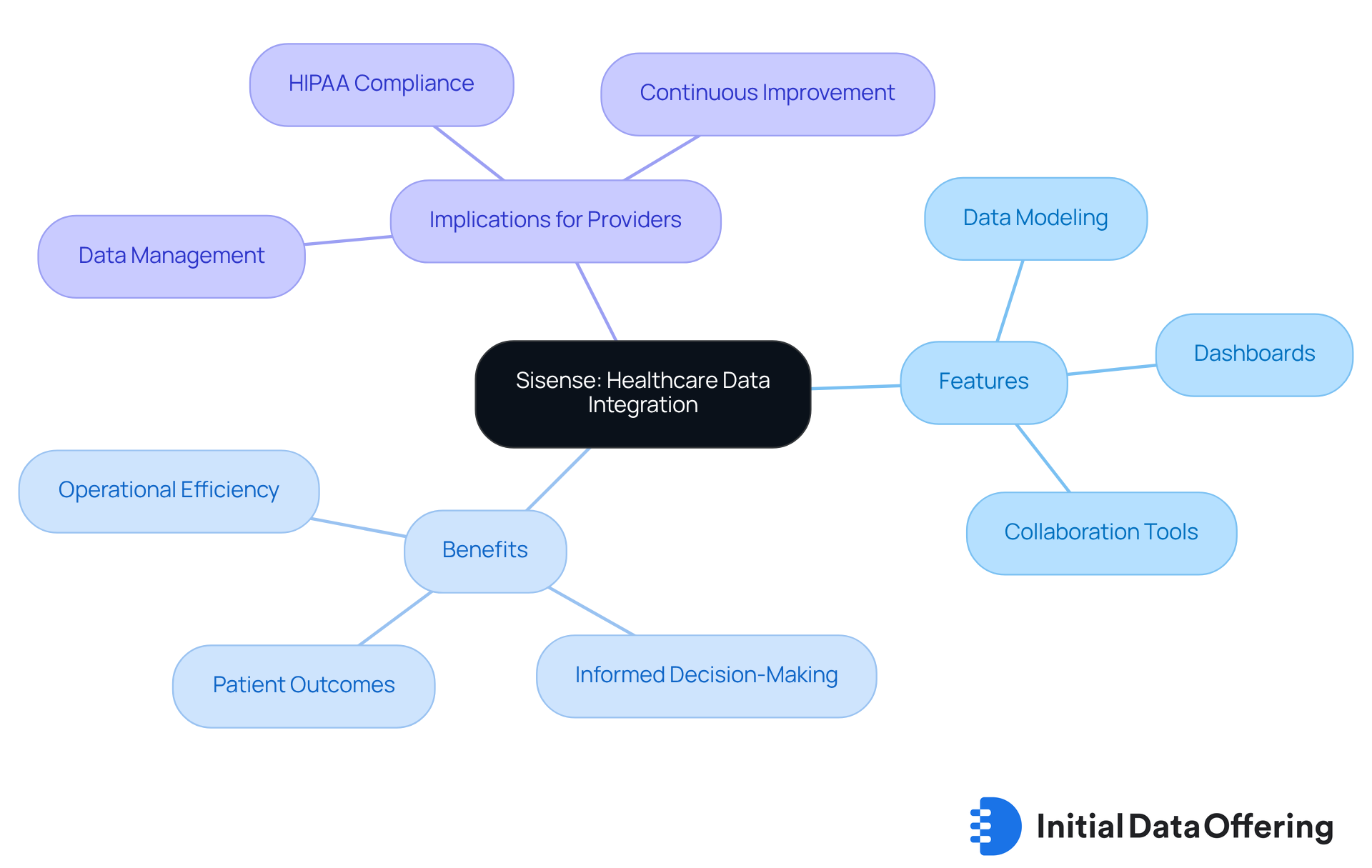
Domo: Real-Time Data Visualization for Healthcare Efficiency
Domo is a cloud-based platform that revolutionizes business intelligence for healthcare by providing real-time data visualization and analytics for medical organizations. Its user-friendly interface allows users to create interactive dashboards that display key metrics and trends instantly. This feature is essential in the fast-paced medical environment, where timely access to information can significantly enhance patient care and operational efficiency. For example, medical organizations using Domo have reported improved decision-making processes, enabling analysts to pinpoint areas for improvement and effectively implement data-driven strategies.
The importance of business intelligence for healthcare, especially real-time analytics, cannot be overstated. It enables swift interventions, allowing medical professionals to respond quickly to patient needs and operational challenges. A notable case is Dr. Consulta, a Brazil-based medical provider that improved care speed and quality while reducing administrative costs by 50% through data-driven decision-making supported by Domo. This transition from a belief-based culture to one grounded in facts demonstrates how real-time information can transform medical service delivery.
Healthcare professionals acknowledge Domo's impact on operational efficiency. As one expert noted, "With the capability to assess extensive volumes of data instantly, medical professionals can make quicker and more informed choices, leading to better outcomes for patients and ultimately saving lives." This perspective underscores the vital role that business intelligence for healthcare plays in real-time data analysis, fostering innovations that enhance service delivery and patient satisfaction. Furthermore, the medical data analysis market is projected to reach $167.0 billion by 2030, with a CAGR of 21.4% from 2023 to 2030, highlighting the growing significance of tools like Domo in this expanding landscape. However, challenges such as information security and compliance with HIPAA regulations remain critical considerations for medical organizations leveraging large-scale analytics.
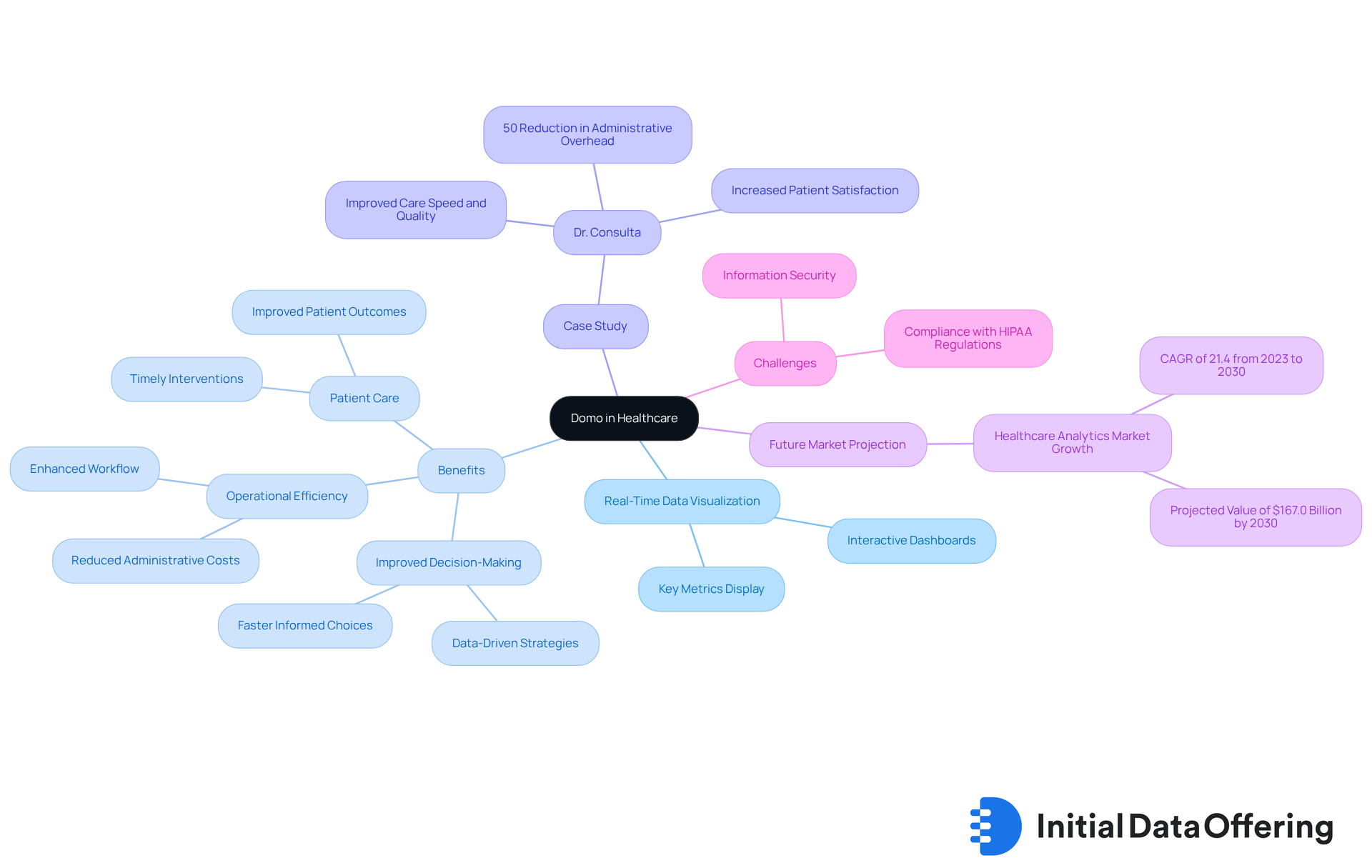
SAP Analytics Cloud: Forecast Patient Needs with Predictive Analytics
SAP Analytics Cloud serves as a robust platform for business intelligence for healthcare, enabling medical analysts to anticipate client needs through advanced predictive analytics. This feature allows organizations to examine historical data and identify emerging trends effectively. By leveraging these insights, medical professionals can use business intelligence for healthcare to optimize resource allocation and address client needs promptly.
The advantages of using SAP Analytics Cloud are significant. Analysts can utilize the insights produced by business intelligence for healthcare to guide strategic planning and boost operational performance, ultimately enhancing care outcomes. For instance, hospitals that implement SAP CRM for medical services report a 15-20% increase in patient feedback ratings. This statistic underscores the beneficial impact of predictive data analysis on patient care.
Moreover, 60% of administrators indicate that they make quicker financial and staffing decisions after adopting business intelligence for healthcare solutions. This supports the claim of effective resource optimization within healthcare settings. As Rami Riman, Director of Clinical and Business Enhancements at InterSystems, points out, the incorporation of AI and predictive data analysis marks a major advancement in medical data evaluation. This ensures that systems remain adaptable and responsive to evolving needs.
Additionally, SAP's integrated compliance structures facilitate adherence to legal requirements, further enhancing the operational aspects of medical data analysis. How can your organization leverage these insights to improve patient care and operational efficiency?
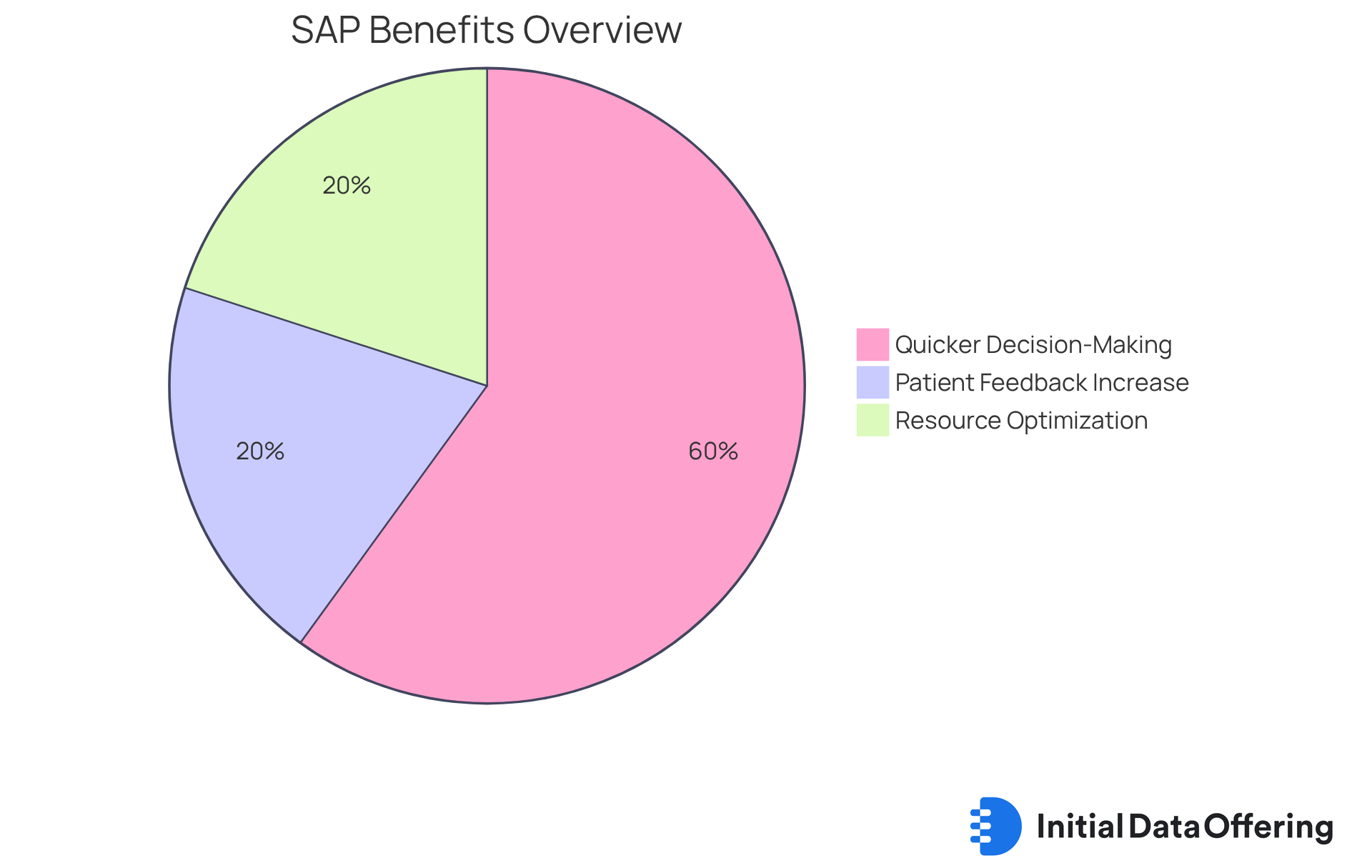
Looker: Empower Data-Driven Decisions in Healthcare
Looker is a contemporary business intelligence for healthcare platform designed specifically for medical organizations, enabling them to make data-driven decisions. Its robust analytics capabilities allow users to explore and visualize information in real time. This feature not only enhances patient care but also boosts operational efficiency.
What advantages does this bring? Looker's seamless integration with various data sources ensures that analysts in the medical field have access to comprehensive information. This access to business intelligence for healthcare is crucial for informed decision-making, enabling organizations to leverage insights effectively.
By utilizing Looker's insights, organizations can refine their strategies and ultimately enhance business intelligence for healthcare delivery. How might your organization benefit from these capabilities? With Looker, the potential for enhanced patient outcomes and streamlined operations is significant, positioning it as a valuable tool for business intelligence for healthcare.
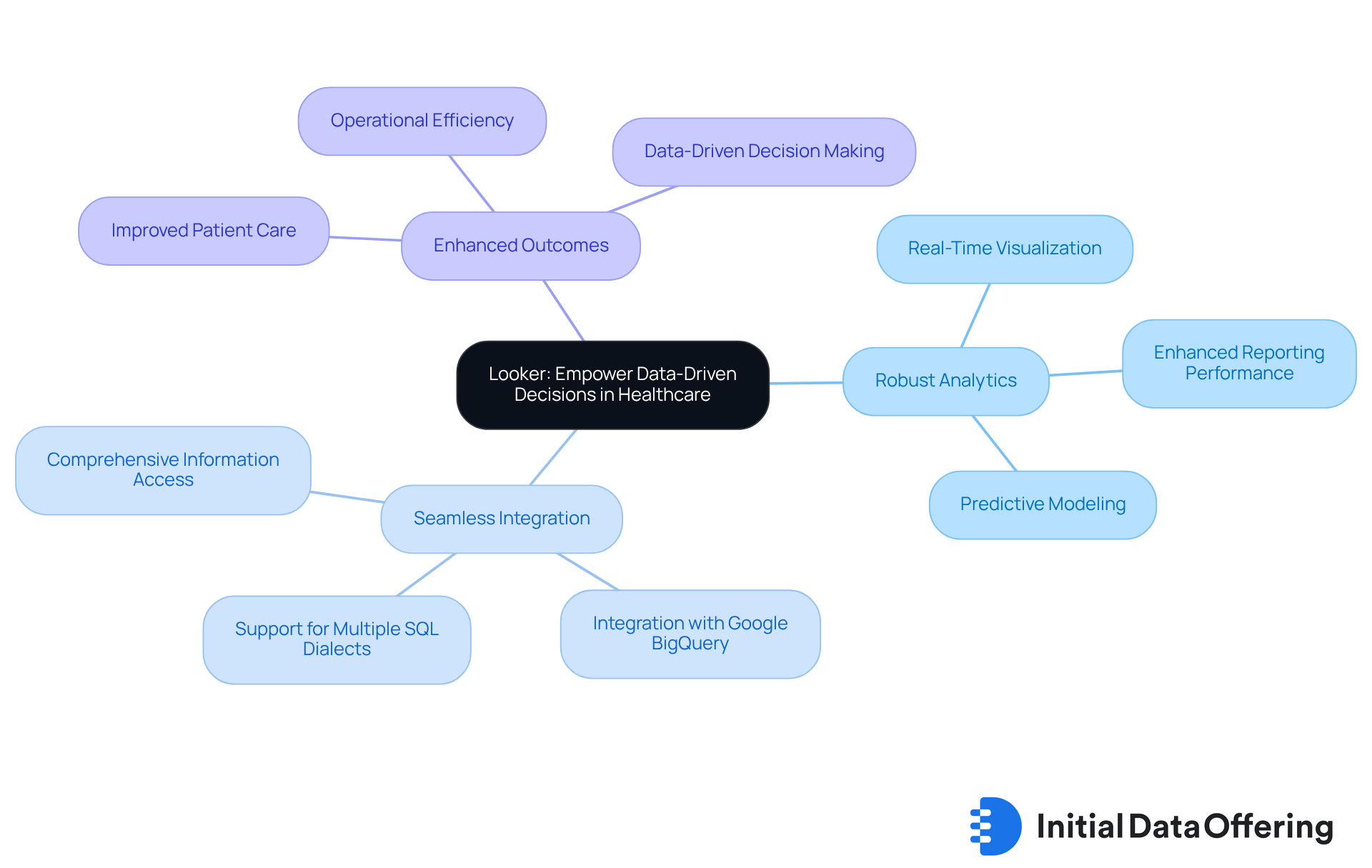
Conclusion
The exploration of business intelligence tools for healthcare analysts underscores the significant impact of data-driven solutions in the medical field. These tools, which integrate advanced analytics and visualization capabilities, empower healthcare professionals to enhance decision-making processes, improve patient outcomes, and streamline operational efficiencies. By leveraging data, organizations can drive innovations that lead to better care delivery and enhanced organizational performance.
Key insights from the article highlight various platforms, such as ThoughtSpot, Tableau, Microsoft Power BI, and IBM Watson Health. Each of these tools offers unique features tailored to the specific needs of healthcare analysts. They not only facilitate real-time data access but also support predictive analytics and visualization. This enables organizations to proactively address patient needs and operational challenges. For instance, case studies presented demonstrate tangible benefits, including reduced readmission rates and improved patient satisfaction, emphasizing the critical role of business intelligence in healthcare.
As the healthcare landscape evolves, embracing these innovative tools becomes essential for organizations aiming to enhance service delivery and patient care. The integration of business intelligence solutions fosters a culture of data-driven decision-making, positioning healthcare providers to adapt swiftly to emerging trends and challenges. By prioritizing the adoption of such technologies, healthcare professionals can significantly impact their practices and contribute to a more effective and responsive healthcare system.
Frequently Asked Questions
What is the Initial Data Offering (IDO)?
The Initial Data Offering (IDO) is a platform designed to simplify the process of launching and discovering new datasets, particularly in the medical field. It curates high-quality datasets to enable analysts to access essential information quickly for better decision-making.
What types of datasets are available on the IDO platform?
The IDO platform features a diverse range of datasets, including alternative information, fundamentals, and ESG metrics, which are crucial for understanding market trends and consumer needs.
How does the IDO enhance analytical processes in healthcare?
The IDO integrates with SavvyIQ's AI-powered Recursive Data Engine, which enriches a dynamic graph of 265 million global entities, allowing analysts to make informed decisions and automate workflows effectively, thereby improving patient care and operational efficiency.
What is ThoughtSpot and how does it benefit healthcare analytics?
ThoughtSpot is an AI-driven analytics platform that enables medical analysts to extract insights from extensive datasets quickly and efficiently. Its search-driven interface allows users to ask questions in natural language, facilitating seamless data exploration and enhancing decision-making in patient care.
What improvements have healthcare organizations experienced using ThoughtSpot?
Healthcare organizations using ThoughtSpot have reported notable improvements in patient care, such as a 33% increase in maternity appointment capacity through intelligent automation, and a 45% decrease in hospital readmission rates for specific chronic disease groups due to predictive analytics.
What percentage of physicians are using medical AI as of 2024?
A recent AMA survey indicated that 66% of physicians reported using medical AI in 2024, reflecting a significant increase in the trend toward data-driven medicine.
What is Tableau and how does it support healthcare decision-making?
Tableau is a leading visualization tool that allows analysts in the medical field to create interactive dashboards, transforming complex datasets into visual formats. This helps uncover patterns and trends, enhancing patient outcomes and operational efficiencies.
How does Tableau address challenges in healthcare information accuracy?
Tableau helps improve compliance and operational metrics by providing reliable information visualization, which is essential for healthcare practitioners who often express concerns about the accuracy of the information they rely on.
Can you provide an example of Tableau's impact in healthcare?
The case study of Intermountain Healthcare illustrates how rethinking information strategies with Tableau can revolutionize medical service delivery, showcasing the practical applications and advantages of using Tableau in healthcare settings.